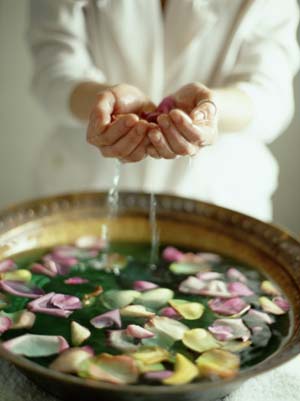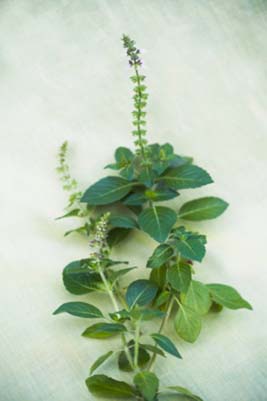Jan 02, 2026
Jan 02, 2026
 Aromatherapy, in the form of floral and herbal extracts and incense, has always been an integral aspect of Ayurvedic healing. From sandalwood incense to enhance the benefits of meditation to water infused with holy basil for purifying the environment, aromas have been a pleasant way to infuse the human psycho-physiology with the healing wisdom of plants.
Aromatherapy, in the form of floral and herbal extracts and incense, has always been an integral aspect of Ayurvedic healing. From sandalwood incense to enhance the benefits of meditation to water infused with holy basil for purifying the environment, aromas have been a pleasant way to infuse the human psycho-physiology with the healing wisdom of plants.
Although single aroma incense and floral waters are not uncommon in Ayurveda, it is more typical to see blends or combinations of several different aromas. The benefits? Synergy and balance.
A synergistic blend of healing substances, according to ayurveda, delivers a holistic benefit that is greater than the sum of its parts. And careful balancing of ingredients is reported to counteract possible side-effects from a single healing substance.

 Ayurveda talks about restoring balance to mind, body and spirit in every season. The three Ayurvedic operators - Vata, Pitta and Kapha - that control all the functions of the mind and body have seasons associated with them as well. Fall and winter are associated with Vata, spring with Kapha and summer with Pitta. There are traditional aroma blends that are particularly useful for restoring overall balance in each of these three seasons. Vata, Pitta and Kapha aroma blends are also useful for personal balance. If you need to pacify one of these doshas, these aroma blends are a convenient and very pleasant way to balance your environment.
Ayurveda talks about restoring balance to mind, body and spirit in every season. The three Ayurvedic operators - Vata, Pitta and Kapha - that control all the functions of the mind and body have seasons associated with them as well. Fall and winter are associated with Vata, spring with Kapha and summer with Pitta. There are traditional aroma blends that are particularly useful for restoring overall balance in each of these three seasons. Vata, Pitta and Kapha aroma blends are also useful for personal balance. If you need to pacify one of these doshas, these aroma blends are a convenient and very pleasant way to balance your environment.
Vata balancing blends generally include sweet warming oils that soothe the mind and emotions and enhance serenity - Sweet Orange, Geranium Rose, Ylang Ylang, and Frankincense, for example. Try equal parts of Ylang Ylang and Frankincense (2-4 drops each) mixed in 2 oz. of a light massage oil such as Jojoba or Sweet Almond for a relaxing therapeutic full-body massage. A couple of drops of the Maharishi Ayurveda Vata blend in hot water works well for facial steam therapy in cold windy weather. A combination of 2 drops of Lemon, 2 drops of Sweet Orange and 4 drops of Jasmine can help you unwind: try this blend as an infusion in a late evening bath. A complex Vata blend can include as many as seven or eight oils in a precise combination for optimum balance.
Pitta tends to get out of balance in situations of extreme heat, whether it be weather-related or emotions-related. Aroma blends for balancing Pitta include sweet cooling oils such as Rose, Fennel and Sandalwood, often with smaller amounts of soothing oils such as Ylang Ylang and Frankincense and some uplifting oils such as Lemon or Peppermint. The combinations are designed to keep you calm, yet focused and alert. Try 4 drops each of Ylang Ylang and Sandalwood for a bathwater infusion on hot days. Or blend equal parts of Vetiver, Sandalwood, Rose, Jasmine and Fennel and use the quantity directed in an aroma diffuser for creating a calm environment and diffusing intensity.
Kapha blends are generally warm, spicy and invigorating, designed to wake you up on damp, cold, gray spring days. They contain vital oils such as Rosemary, Eucalyptus, Peppermint and Basil, with smaller amounts of balancing oils such as Frankincense or Ylang Ylang. Try four drops of Peppermint and 2 drops each of Frankincense and Ylang Ylang as a bath infusion in a morning bath or as part of your shower gel (use 4-6 drops per 2 oz. of unscented cleanser) - you'll feel the invigorating aromas subtly balance your body and mind long after you've bathed or showered. A drop each of Eucalyptus and Basil works wonders in steam therapy water on moist cold days. This blend will help you feel fresh, alert and clear.
Healing scents afford both pleasure and gentle balance for body, mind and spirit. The Maharishi Ayurveda Vata, Pitta and Kapha aroma oils are pre-balanced blends that offer synergistic benefits. Use them in every season to restore harmony!
Disclaimer:
Information provided in this article is for the sole purpose of imparting education on Ayurveda and is not intended to diagnose, treat, cure or prevent any disease. If you have a medical condition, please consult your physician.
18-Nov-2001
More by : Vasu Nargundkar